|
|
|
Sort Order |
|
|
|
Items / Page
|
|
|
|
|
|
|
| Srl | Item |
| 1 |
ID:
131507


|
|
|
|
|
| Publication |
2014.
|
| Summary/Abstract |
Two parallel norms mandate an international duty to hold state leaders individually accountable for serious corruption and human rights crimes. The development of these new norms is poorly explained by realist and neoliberal perspectives, but there are also weaknesses in recent constructivist explanations of norm diffusion that emphasize agency at the expense of structure. Such approaches have difficulty explaining the source of and similarities between new norms, and treat norm entrepreneurs as prior to and separate from their environment. In contrast, drawing on sociological institutionalism, we present a more structural explanation of individual accountability norms. The norms derive from an overarching modernist world culture privileging individual rights and responsibilities, as well as rational-legal authority. This culture is more generative of norm entrepreneurs than generated by them. The specific norms are instantiated through a process of "theorization" within permissive post-Cold War conditions, and diffused via mimicry, professionalization, and coercive isomorphism
|
|
|
|
|
|
|
|
|
|
|
|
|
|
|
|
| 2 |
ID:
193826


|
|
|
|
|
| Summary/Abstract |
Established as a multilateral development bank (MDB) funded by African states, the African Development Bank (AfDB) is one of many similar international organizations (IO s) comprising the development finance regime complex. Arguably, states and policy elites recreate similar IO s that enable “norm conformance” within the complex. This is demonstrated through the AfDB’s adoption of the Independent Recourse Mechanism (IRM) in 2004. Despite no need or demand, the relatively insulated AfDB agreed to provide recourse for people adversely affected by AfDB-financed projects. This article argues that consensus among state and nonstate actors around an accountability policy norm led the AfDB to conform. Nonregional Member States, particularly the United States, used typical norm diffusion mechanisms: financial incentives, normative suasion, and voting on the AfDB’s Board. The concept of norm conformance highlights how behavioral expectations and organizational practices change based on what is socially appropriate.
|
|
|
|
|
|
|
|
|
|
|
|
|
|
|
|
| 3 |
ID:
172844
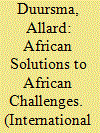

|
|
|
|
|
| Summary/Abstract |
The current scholarly literature on the international mediation of civil wars draws predominantly on a rationalist-materialist perspective. This perspective suggests that the ticket to mediation success is the material manipulation of the bargaining environment by third parties with a high degree of economic and military resources. I argue that legitimacy also determines outcomes of mediation because if a mediator has legitimacy, it can continue to look for a mutually satisfactory outcome and try to pull the conflict parties toward compliance. I show that legitimacy matters by systematically comparing the effectiveness of African and non-African third parties. African third parties are typically considered ineffective because of a low degree of economic and military capacity. However, they effectively mediate civil wars in Africa because of a high degree of legitimacy, which is a result of a strong conviction within the African society of states that African mediation is the most desirable type in conflicts there. Drawing on data from the Uppsala Conflict Data Program supplemented with unique data, which together cover all mediation efforts in Africa between 1960 and 2017, I find quantitative evidence supporting the effectiveness of African third parties. Compared to non-African ones, African third parties are far more likely to conclude negotiated settlements that are more likely to be durable. African third parties are especially effective if the conflict parties are highly committed to the African solutions norm. Theoretically, this study deviates from much of the literature that puts forward solely rationalist-materialist explanations of mediation success. By bringing legitimacy to the forefront, this article supplements the current mediation literature that emphasizes material sources of power and ignores social structures.
|
|
|
|
|
|
|
|
|
|
|
|
|
|
|
|
| 4 |
ID:
158674
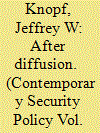

|
|
|
|
|
| Summary/Abstract |
This article discusses six challenges to enforcing norms regarding nuclear weapons. Three challenges reflect generic problems in international politics. These are differences in power, the collective action problem, and trade-offs with other interests. Three additional dilemmas reflect specific characteristics of the nuclear realm. First, membership in international treaties connected to the norms is not universal, raising questions about the appropriateness of enforcement against states that have not signed the treaties. Second, different implications of the norms can come into conflict with each other. In particular, there can be tensions between the requirements of nonproliferation and disarmament norms. Finally, some common options for norm enforcement become quite problematic when dealing with nuclear weapons. For example, if states respond to defections by starting their own nuclear weapons programs, this tit-for-tat response would defeat the purposes of the nonproliferation regime. Despite these challenges, nuclear norms enjoy widespread support and some enforcement is possible.
|
|
|
|
|
|
|
|
|
|
|
|
|
|
|
|
| 5 |
ID:
058826


|
|
|
| 6 |
ID:
169245
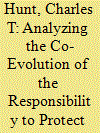

|
|
|
|
|
| Summary/Abstract |
This article analyses the Responsibility to Protect (R2P) in conjunction with the Protection of Civilians (POC) in peace operations. It examines where and how the two concepts have challenged, altered, led to reinterpretations and had feedback effects on each other. Drawing on methods from discourse analysis, the article examines their: gradual institutionalization at the United Nations (UN); deployment in the practices of the Security Council; and, influence over the actions of operations in the field. The analysis shows that the R2P has co-evolved with POC and particularly the implementation of POC through UN peace operations. The article illustrates that the emergence of the R2P and the trends in POC in peace operations have cross-fertilised in discourse and practice at the UN regarding the prevention and response to egregious of human rights abuses. It argues that this has influenced their respective trajectories with ramifications for understanding the normative trajectory and status of the R2P as it enters its third decade in popular lexicon. In particular, it posits that understanding the current and future status of the R2P will be enhanced by insights into how the R2P has shaped, but also been shaped by, other contiguous normative agendas, thematic areas and practices.
|
|
|
|
|
|
|
|
|
|
|
|
|
|
|
|
| 7 |
ID:
112785
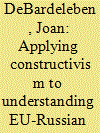

|
|
|
|
|
| Publication |
2012.
|
| Summary/Abstract |
The improved relations between Russia and the European Union (EU) in the 1990s were followed by a rise in tension since 1999. This article argues that constructivism can provide important insights into the basis of continuing difficulties. Drawing on the nature of the two actors, the author argues that the foreign policy identities of both actors are in a formative process, and thus the construction of inter-subjective meanings has the potential to be a particularly transformative element in the relationship. Both the Russian Federation and the EU are relatively new as regional and global actors, and both are in the process of forming their foreign policy identities, although in quite different contexts. Neither the EU nor Russia has developed a strategic conception for the relationship, and political discourse often obstructs communication rather than furthering the generation of inter-subjective meanings. The article argues that a constructivist analysis can help to expose the deep interconnections between normative disagreements, conflicting constructions of interests and differing concepts of governance.
|
|
|
|
|
|
|
|
|
|
|
|
|
|
|
|
| 8 |
ID:
120718
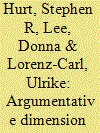

|
|
|
|
|
| Publication |
2013.
|
| Summary/Abstract |
Abstract Not only is the participation of developing countries in international trade negotiations growing, so is their influence over the global trade agenda. This article highlights the increasing activism and impact of African states through a detailed study of the current Economic Partnership Agreement (EPAs) negotiations with the European Union (EU). In examining African resistance to EPAs, the article develops a constructivist approach to North-South trade negotiations that pays close attention to the role of development discourses. We argue that the growing willingness of African states to challenge the EU to deliver on its development promises during the decade-long EPA process was crucial to informing their sustained opposition to the EU's goal of completing a comprehensive set of sub-regional economic agreements. We document African resistance to EU trade diplomacy in the EPAs, exploring how these otherwise weak countries were able to pursue normative-based negotiation strategies by recourse to the EU's promise of a 'development partnership.'
|
|
|
|
|
|
|
|
|
|
|
|
|
|
|
|
| 9 |
ID:
080573
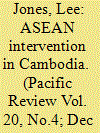

|
|
|
|
|
| Publication |
2007.
|
| Summary/Abstract |
Despite their other theoretical differences, virtually all scholars of the Association of Southeast Asian Nations (ASEAN) agree that the organization's members share an almost religious commitment to the norm of non-intervention. This article disrupts this consensus, arguing that ASEAN repeatedly intervened in Cambodia's internal political conflicts from 1979 to 1999, often with powerful and destructive effects. ASEAN's role in maintaining Khmer Rouge occupancy of Cambodia's UN seat, constructing a new coalition government in exile, manipulating Khmer refugee camps and informing the content of the Cambodian peace process will be explored, before turning to the 'creeping conditionality' for ASEAN membership imposed after the 1997 'coup' in Phnom Penh. The article argues for an analysis recognizing the political nature of intervention, and seeks to explain both the creation of non-intervention norms and specific violations of them as attempts by ASEAN elites to maintain their own illiberal, capitalist regimes against domestic and international political threats.
|
|
|
|
|
|
|
|
|
|
|
|
|
|
|
|
| 10 |
ID:
154338
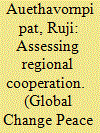

|
|
|
|
|
| Summary/Abstract |
Existing studies of Association of Southeast Asian Nations (ASEAN) states’ engagement with migrant worker rights focus on the experience of such workers from gender, labour and security perspectives. As such, these studies are yet to consider the broader impact of migrant worker rights on the process and nature of cooperation between ASEAN members. This article addresses this gap by framing migrant worker rights within the broader human rights socialization ongoing within Southeast Asia, driven by both members of ASEAN and external stakeholders. It argues that, contrary to many existing accounts of norms as creating shared commitments, migrant worker rights have led to considerable contestation, often driven by diverging national approaches to the issue. This article examines the impact of migrant worker rights norms on Thailand, the largest labour-recipient state in ASEAN. It asserts that Thailand’s diverging experience is caused by the lack of norm precision, resulting in the applicatory contestation of such norms.
|
|
|
|
|
|
|
|
|
|
|
|
|
|
|
|
| 11 |
ID:
160117
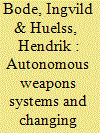

|
|
|
|
|
| Summary/Abstract |
Autonomous weapons systems (AWS) are emerging as key technologies of future warfare. So far, academic debate concentrates on the legal-ethical implications of AWS but these do not capture how AWS may shape norms through defining diverging standards of appropriateness in practice. In discussing AWS, the article formulates two critiques on constructivist models of norm emergence: first, constructivist approaches privilege the deliberative over the practical emergence of norms; and second, they overemphasise fundamental norms rather than also accounting for procedural norms, which we introduce in this article. Elaborating on these critiques allows us to respond to a significant gap in research: we examine how standards of procedural appropriateness emerging in the development and usage of AWS often contradict fundamental norms and public legitimacy expectations. Normative content may therefore be shaped procedurally, challenging conventional understandings of how norms are constructed and considered as relevant in International Relations. In this, we outline the contours of a research programme on the relationship of norms and AWS, arguing that AWS can have fundamental normative consequences by setting novel standards of appropriate action in international security policy.
|
|
|
|
|
|
|
|
|
|
|
|
|
|
|
|
| 12 |
ID:
181935
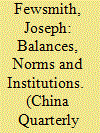

|
|
|
|
|
| Summary/Abstract |
In recent years, explanations of the Chinese Communist Party's longevity as a ruling party have focused on institutionalization. But a close look at the four leaders of China since 1978 reveal that institutions have remained weak. Of much greater importance have been balances that reflect the informal distribution of power and norms that express agreed-upon Party procedures. Of yet even greater importance have been the efforts of individual leaders to concentrate power in themselves through the appointment of protégés to critical positions. Such leaders also attempt to extend their influence beyond their terms in office through those protégés and their roles as “elders.” Thus, we see a tension between Party norms and the centralizing tendencies of Leninist systems in which the centralizing tendencies usually prevail. With Xi Jinping, we see a far greater personalization of power disrupting the norms and balances existing under previous leaders.
|
|
|
|
|
|
|
|
|
|
|
|
|
|
|
|
| 13 |
ID:
082408


|
|
|
|
|
| Publication |
2008.
|
| Summary/Abstract |
This analysis examines ballistic missile proliferation in the context of strategic interactions among neighboring states. The analysis finds that when faced with ballistic missile threats, nations respond rationally and acquire ballistic missiles as a deterrent. Using a panel data set of 119 countries from 1967 to 1997, this study shows that the probability of a country procuring ballistic missiles increases nonlinearly as the number of bordering states with ballistic missiles increases. Although international norms arising from the Missile Technology Control Regime reduced the probability of missile proliferation, these externalities did not offset a state's decision to arm in response to ballistic missile arsenals in neighboring states. This analysis also finds that surface-to-air missiles (SAMs) increased the probability of proliferation in two ways: first, because ballistic missiles provided states ``ensured penetration'' of a rival's air defenses; and second, because SAMs reduced the ability of a rival to retaliate against a ballistic missile attack
|
|
|
|
|
|
|
|
|
|
|
|
|
|
|
|
| 14 |
ID:
166861
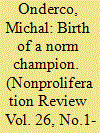

|
|
|
|
|
| Summary/Abstract |
In 1995, South Africa was in a special position. It was: a new party to the Treaty on the Non-Proliferation of Nuclear Weapons (NPT), the first country to voluntarily renounce nuclear weapons, led by a charismatic leader, and seen as a champion of disarmament principles. Yet South Africa’s new leaders were also interested in affirming their position within the Non-Aligned Movement, which was adamantly opposed to the NPT’s indefinite extension. Why, then, did South Africa decide to support the indefinite extension of the NPT in 1995? Existing scholarship has ascribed too much credit to pressure from the United States, overlooking domestic debates in South Africa and the bifurcation between professional diplomats and political elites. This article, building on new archival sources and in-depth oral-history interviews with major actors, demonstrates that South African diplomats opposed indefinite extension while South African policy elites allocated little attention to the topic until late in the game. The findings contribute to our understanding of South Africa’s norm entrepreneurship, as well as the politics of global nonproliferation.
|
|
|
|
|
|
|
|
|
|
|
|
|
|
|
|
| 15 |
ID:
164463


|
|
|
|
|
| Summary/Abstract |
Following the attacks of 9/11, the United States adopted a policy of torturing suspected terrorists and reinterpreted its legal obligations so that it could argue that this policy was lawful. This article investigates the impact of these actions by the United States on the global norm against torture. After conceptualizing how the United States contested the norm against torture, the article explores how US actions impacted the norm across four dimensions of robustness: concordance with the norm, third-party reactions to norm violations, compliance, and implementation. This analysis reveals a heterogeneous impact of US contestation: while US policies did not impact global human rights trends, it did shape the behavior of states that aided and abetted US torture policies, especially those lacking strong domestic legal structures. The article sheds light on the circumstances under which powerful states can shape the robustness of global norms.
|
|
|
|
|
|
|
|
|
|
|
|
|
|
|
|
| 16 |
ID:
142598
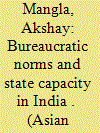

|
|
|
|
|
| Summary/Abstract |
Himachal Pradesh outperforms other Indian states in implementing universal primary education. Through comparative field research, this article finds that bureaucratic norms—unwritten rules that guide public officials—influence how well state agencies deliver services for the poor. The findings call attention to the informal, everyday practices that generate state capacity.
|
|
|
|
|
|
|
|
|
|
|
|
|
|
|
|
| 17 |
ID:
178498
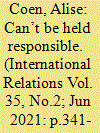

|
|
|
|
|
| Summary/Abstract |
States have increasingly moved away from refugee protection, intensifying the vulnerability of refugees and asylum-seekers. Drawing on theories of norm dynamics within International Relations (IR), this article argues that departures from refugee protection can be partly explained by the weakness of the normative principles governing the treatment of individuals fleeing persecution. Ambiguities, diverging interpretations, and varying levels of codification complicate efforts to hold states accountable to a complex bundle of human rights standards surrounding refugee and asylum protection. These weaknesses in the international refugee regime bolster norm-evading behavior wherein governments deliberately minimize their obligations while claiming technical compliance. Drawing on an analysis of US refugee and asylum policies under the Trump administration, the article reveals how norm evasion and accountability challenges emerge in the context of ambiguous standards vis-à-vis non-refoulement, non-detention, non-penalization, non-discrimination, and refugee responsibility-sharing.
|
|
|
|
|
|
|
|
|
|
|
|
|
|
|
|
| 18 |
ID:
084441
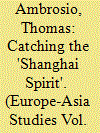

|
|
|
|
|
| Publication |
2008.
|
| Summary/Abstract |
This article examines how the Shanghai Cooperation Organization (SCO) seeks to undermine democratisation in Central Asia. Prior studies of the interplay between international organisations and democracy have tended to examine only one half of this relationship: whether, how, and under what circumstances do international organisations promote democracy? However, the opposite has been largely ignored: how do international organisations sustain autocracy? Authoritarian governments are increasingly adopting policies aimed at preserving their political power and the SCO represents an additional strategy in this regard: utilising multilateral cooperation to defend themselves against regional or global democratic trends. As such, the 'Shanghai Spirit' may be a sign of things to come as autocratic leaders become more bold in their rejection of democratic norms.
|
|
|
|
|
|
|
|
|
|
|
|
|
|
|
|
| 19 |
ID:
160049
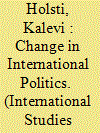

|
|
|
|
|
| Summary/Abstract |
This essay notes the major changes in actors, institutions, and processes of international politics over the last four centuries. It emphasizes wars, revolutions, and the dreams of major historical figures such as Nepoleon and Hitler as the major sources of change. Important legacies of these changes include norms that have de-legitimized territorial conquest and organizations committed to the peaceful resolution of international conflicts.
|
|
|
|
|
|
|
|
|
|
|
|
|
|
|
|
| 20 |
ID:
162679


|
|
|
|
|
| Summary/Abstract |
Recent alleged uses of chemical weapons in Syria and Iraq have led to a renewed interest in the topic. The starting point for modern chemical warfare is World War I, of which much has been written. Interestingly, many of the cases of chemical warfare after that war and prior to World War II are not as fully fleshed out as one might expect, since the most recent case was over seventy-five years ago. This study looks at evidence on cases of chemical warfare from 1919 to 1939 to ask what we know about those cases and what remains to be answered. This period, bookended by the birth of modern chemical warfare and the widely noted pattern of non-use during World War II, was a time of uncertainty about whether and how the production and use of chemical weapons might spread. A number of cases, both those generally accepted and those more contentious, are reviewed, and a few common themes are teased out in the final section of the study. In particular, the norm against chemical weapons during these two decades appeared to be limited to the view that states would generally refrain from being the first to use chemical weapons against European, particularly possessor, states, but in other conflicts the employment of such weapons was at least considered, and occasionally carried out. Many information gaps remain, and it is hoped that the descriptions of the cases will encourage others to carry out further research.
|
|
|
|
|
|
|
|
|
|
|
|
|
|
|
|
|
|
|
|
|